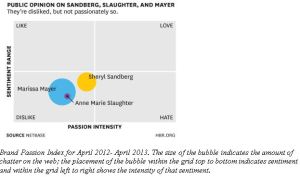
Madeline Heilman
Women face workplace challenges when they “succeed” in traditionally-male roles, found New York University’s Madeline Heilman, Aaron Wallen, Daniella Fuchs and Melinda Tamkins.
They found that woman who are recognized as successful in roles dominated by men, are less liked than equally successful men in the same fields.
Successful women managers avoided interpersonal hostility, dislike, and undesirability when they conveyed “communal” attributes through behaviors, testimonials of others, or their role as mothers, found Heilman, with University of Queensland’s Tyler Okimoto.
This competence-likeability disconnect was demonstrated by Stanford’s Frank Flynn in a Harvard Business School case of Silicon Valley venture capitalist and entrepreneur Heidi Roizen, who was seen as competent but disliked.
He and Cameron Anderson of UC Berkeley changed Heidi’s name to “Howard Roizen” for half of the participants who read the case.
These volunteers rated Heidi and “Howard” on perceived competence and likeability.
Heidi was rated as equally highly competent and effective as “Howard,” but she was also evaluated as unlikeable and selfish.
Most participants said they wouldn’t want to hire her or work with her.
Whitney Johnson, co-founder of Disruptive Advisors and her colleague Lisa Joy Rosner evaluated “Brand Passion Index” (BPI) for recognisable, accomplished women over 12 months by:
- Activity (number of media mentions),
- Sentiment (positive or negative emotional tone),
- Intensity (strong or weak sentiment).
 These competent, well-known women were not liked, and were evaluated with harsh negative attributions based on media coverage and at-a-distance observations. Some were characterised as
These competent, well-known women were not liked, and were evaluated with harsh negative attributions based on media coverage and at-a-distance observations. Some were characterised as
- impressive and smart, and annoying, a bully,
- excellent, successful working mom and bizarre,
- amazing, successful mother and destructive, not a good wife,
The competence-likeability dilemma was demonstrated in hiring behaviour experiments by Rutgers University’s Laurie Rudman and Peter Glick of Lawrence University.
Volunteers made “hiring decisions” for male and female “candidates” competing for a “feminized” managerial role and a “masculinized” managerial role.
Applicants were presented as demonstrating:
- Stereotypically male behaviors (“agentic”)
- Stereotypically female behaviors (“communal”)
- Both stereotypically male and female behaviors (“androgynous”).
Women who displayed “masculine” traits were viewed as less socially acceptable and were not selected for the “feminized” job.
However, this hiring bias did not occur when these women applied for the “male” job.
“Niceness” was not rewarded when competing for jobs: Both male and female “communal” applicants received low hiring ratings.
Combining niceness with agency improved the “hiring” outcome for “androgynous” female “applicants.”
Rudman and Glick noted that “… women must present themselves as agentic to be hirable, but may therefore be seen as interpersonally deficient.”
They advised women to “temper their agency with niceness.”
The competence-likeability disconnect is also observed when women negotiate for salary and position, reported by Linda Babcock of Carnegie Mellon.
Her research demonstrated negative evaluations of women who negotiate for salaries using the same script as men.

Deborah Gruenfeld
The likeability-competence dilemma may be mitigated by integrating powerful body language with appeasing behaviors that build relationships and acknowledge others’ authority, suggested Stanford’s Deborah Gruenfeld.
She posited that many women have been socialized to adopt less powerful body language including:
- Smiling,
- Nodding,
- Tilting the head,
- Applying fleeting eye contact,
- Speaking in sentence fragments with uncertain, rising intonation at sentence endings.
Some people in decision roles expect women to behave in these ways, and negatively evaluate behaviors that differ from expectations.
Body language is the greatest contributor to split-second judgments (less than 100 milliseconds) of people’s competence, according to Gruenfeld.
She estimated that body language is responsible for about 55% of judgments, whereas self-presentation accounts for 38%, and words for just 7%.
Her earlier work considered body language on assessments of power, and more recently, she investigated gender differences in attributions of competence and likeability.
The likeability-competence conflict may be reduced when women give up physical space to convey approachability, empathy, and likeability, she noted.
Posing in more powerful positions for as little as two minutes can change levels of testosterone, a marker of dominance, just as holding a submissive posture for the same time can increase cortisol levels, signaling stress, according to Gruenfeld.
She suggested that women practice “the mechanics of powerful body language.”
Women’s competence-likeability dilemma is not mitigated by achieving workplace success and status.
University of North Carolina’s Alison Fragale, Benson Rosen, Carol Xu, Iryna Merideth found that successful women and men are judged more harshly for mistakes than lower status individuals who make identical errors.
Fragale’s team found that observers attributed greater intentionality, malevolence, and self-concern to the actions of high status wrongdoers than the identical actions of low status wrongdoers.
Volunteers recommended more severe punishments for higher status individuals.
Wrongdoers who demonstrated concern for others, charitable giving, and interpersonal warmth built goodwill that could protect from subsequent mistakes.
-*How do you convey both likeability and competence?
RELATED POSTS:
- Women Don’t Ask for Raises or Promotions as Often as Men
- Women Who Negotiate Salaries May Elicit Negative Evaluations
- “Everything is Negotiable”: Prepare, Ask, Revise, Ask Again
- Thoughts Change Bodies, Bodies Change Minds, Roles Shape Hormones
- Powerful Non-Verbal Behavior May Have More Impact Than a Good Argument
- Power Tactics for Better Negotiation
- Women’s Career Development – Negotiation, Networking-Mentoring, Sponsorship, Skillful Self-Promotion
©Kathryn Welds




















































































